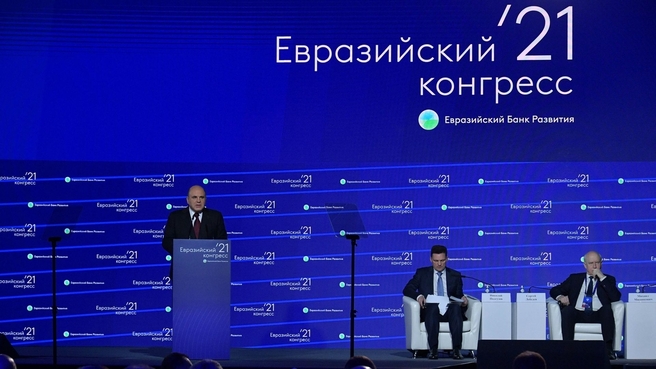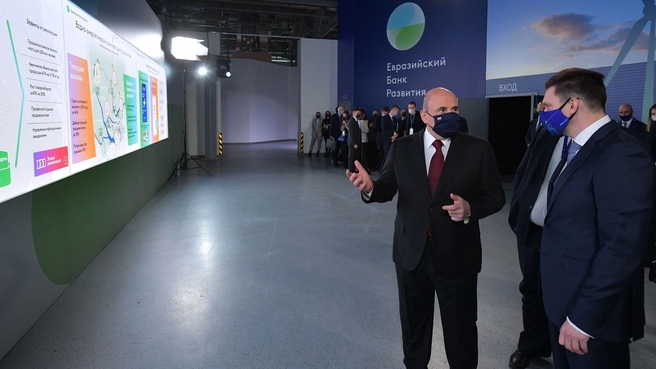Mikhail Mishustin took part in the plenary session of the Second Eurasian Congress, “Key investment projects as system-wide drivers of economic growth in the EAEU.”
Mikhail Mishustin’s remarks at the plenary session of the Second Eurasian Congress:
Good afternoon, friends.
I am glad to welcome you all at the Eurasian Congress.
First of all, I would like to thank the Eurasian Development Bank (EDB) for organising this event. Today you have an extensive integration agenda. It is only the second time that the congress has been held, but we can already see that it is a popular platform for discussing the essential issues of expanding cooperation within the Eurasian Economic Union. Representatives of government bodies as well as the business, research and expert communities join the discussion. This open dialogue is an opportunity to present one’s vision of achieving sustainable development of the region we share, improve people’s welfare and do everything we can for this union to be the most comfortable place to live and do business.
Our five countries are overcoming the consequences of the COVID-19 pandemic. We are rounding up this year with rather good indicators that are higher than the pre-pandemic levels. The EDB estimates that the EAEU’s GDP will grow by 4 percent this year.
Mutual trade is recovering fast, growing by one-third between January and September. By the end of the year, the turnover may increase by more than 10 percent and exceed the pre-pandemic figures from 2019.
We need to take coordinated action to maintain the current pace and make further progress in integration.
By removing barriers for goods, services, investment and workforce, we are creating new opportunities for joint initiatives in a variety of spheres.
EAEU governments are backing up the implementation of the Strategic Directions for Eurasian Economic Integration Development until 2025. Common markets are taking shape, including financial, energy, gas, oil and oil product markets. The institutional foundation has been built to create a common digital space across the EAEU.
The Work Without Borders service and the COVID-Free Travel app are particularly helpful and widely used as they make employment and travel across the union substantially easier.
There should be more useful solutions of this kind for people and businesses. Our job is to develop an entire ecosystem of digital projects, both autonomous and inter-connected, to give a good boost to integration.
Another important task is to ensure that all territories of the union are connected, by improving logistics for faster delivery of goods and comfortable travel. Moreover, our cooperation in transport and infrastructure development is of key importance, for it is part of the integration between the EAEU and China’s Belt and Road Initiative, as well as, of course, the gestating greater Eurasian partnership that was proposed by President of Russia Vladimir Putin.
Russia, Kazakhstan and China have started working on the Europe – Western China international transport corridor. One of its sections is the Kazan – Moscow motorway that will be further extended towards the Baltic and Northern Europe. We are preparing to launch the construction of the Meridian motorway that will run from Russia’s border with Kazakhstan through eight Russian regions and continue to Belarus and Central Europe.
This is just a portion of the work that needs to be done. We need to build a solid Eurasian transport system – that is, create a consolidated network of railway, motorway, maritime, river and aviation infrastructure in Eurasia.
Development of the East – West transport corridor (that already shows significant progress) and the North – South transport corridor will allow for increasing cargo traffic, including transit traffic between China and the European Union.
This form of trans-continental transport unity is extremely important for the EAEU landlocked countries. That will help them raise GDP and increase foreign trade. Essentially, the entire union, relying on railway and motorway routes, will become the most important transport hub of the global economy.
During the congress, you will also discuss other cross-border infrastructure projects with tangible integration effects: projects in transport and logistics, hydropower, food hubs and digital infrastructure.
Unlocking their enormous potential will ensure a steady dynamic of further economic growth of the EAEU members and other countries in the region.
I think we should have a broader perspective of the EAEU’s capacities, set even more ambitious goals for ourselves and explore new areas of cooperation.
The global climate agenda may be one of them. The leaders of our countries adopted a joint statement on climate. Their agreements will kick-start the development of a common climate regulation system for the EAEU as well as joint initiatives on a number of related issues.
We plan to make a significant contribution to combating climate change. We will take measures to control and curb greenhouse gas emissions and manage natural ecosystems.
Our success depends on the availability of new technologies and, of course, funding. We welcome participation from businesses in these projects and believe that major international initiatives must also be fulfilled, through effective use of the resources of the Eurasian Development Bank and the Eurasian Fund for Stabilisation and Development.
I have said more than once that environmental problems require collective action. It is the only way to achieve the best results and preserve nature for future generations.
Friends,
The Eurasian Economic Union is a strong international association that is gaining more authority on the global stage. We are establishing close links and mutually beneficial cooperation with other countries and regional integration bodies.
We do have something to offer to our partners. The EAEU’s cumulative potential can deal with a wide range of issues. The EAEU has six free trade agreements, with Vietnam, Iran, Singapore, Serbia and China (two). We are negotiating more relaxed trade conditions with Egypt and Israel. We are about to start talks with India.
Uzbekistan and Cuba benefit greatly from their observer state status as they have noticeably intensified their cooperation with the Eurasian Economic Commission and received more opportunities to expand trade and economic relations.
All these achievements give rise to additional growth and development prospects in this union.
It is important that the congress programme includes meetings of integration bodies, the CIS Economic Council and the Council of the Eurasian Economic Commission. Their agendas focus on important aspects of multilateral cooperation, including directives from the CIS and EAEU heads of state and heads of government.
I am confident that during this open discussion, congress participants will be able to discuss these and many other topical issues, propose new approaches and solutions that will strengthen Eurasian integration.
I wish you productive work and informative discussions.














